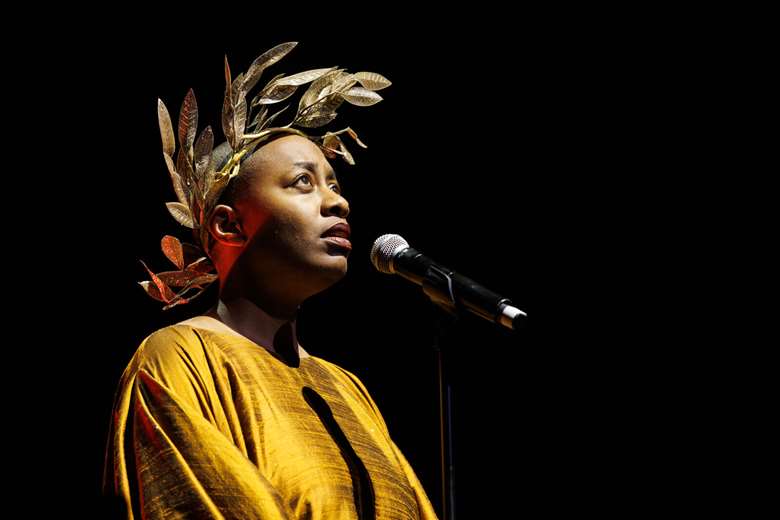Cécile McLorin Salvant “operating completely on her own level” with fairytale jazz fantasy ‘Ogresse’
Hugh Morris
Monday, August 7, 2023
The Grammy Award-winning vocalist enthrals with a hugely imaginative jazz suite backed by a top-notch ensemble led by Darcy James Argue

Cécile McLorin Salvant’s recent career has embraced the fantastical and the folkloric. Her album Ghost Song, released in 2022, put Kurt Weill, Kate Bush and material from her diaries through a light, slightly whimsical distorting filter. Mélusine from this year, takes this idea further: sung mostly in French, it works in the occult, Louis XIV-era composer Michel Lambert, and wiggly analogue synths, and extends into trippy animated videos featuring Salvant’s designs twisted into charming cartoons by Amanda Bonaiuto.
‘Ogresse’, her 90-minute song cycle for solo voice and medium-sized ensemble, comes straight from that explorative moment. Receiving its UK premiere at the Edinburgh International Festival, it’s a substantial achievement from one of the discipline’s most consistently curious voices.
The libretto for ‘Ogresse’ was written by Salvant. The piece unfolds as a mythical fairytale about a monster seduced by a man from the local town in order to kill her. She’s sceptical of his advances, but eventually falls for him, and ends with her poisoning him and then eating him, killing both. It’s told in a wide-eyed, light-hearted way by Salvant, that only makes the switches into serious more profound. A moment where she turns her back on the crowd and the ensemble builds through funereal, increasingly angry improvising is extremely moving.

Cécile McLorin Salvant performs Ogresse at Edinburgh International Festival – Photo © Andrew Perry
‘Ogresse’ wanders through a history of jazz-adjacent styles, all twisted into something fresh as Salvant teases out uneven structures through fluid poetry. Carrying the drama are recitative-like sections, underscored by Brandon Seabrook on banjo and bassist Yasushi Nakamura. Other instrumental curiosities pile up; Josh Roseman doubles trombone and tuba, Tom Christensen adds oboe and cor anglais to sax duties, and Helen Sung plays melodica and pipe organ on top of piano. The ensemble playing is unshowy to the point of understatedness, in spite of the strength of the band; the vibe that conductor and arranger Darcy James Argue emphasises through constantly inventive arrangements is selflessness, always in service of something bigger.
That extends to Salvant too, an artist operating completely on her own level. She designed the programmes, the flowery interior of the theatre, and clearly had a hand in the visuals through the show, which are simple but interesting and distinctively hers. Her clothing – a sparkly headdress made of leaves, and a dark gold dress with snakes embroidered on the back – adds another subtle storytelling element. The performance avoids the histrionics of some gruesome folk stories, meaning the span of the work is thinner and more focused. Even then, there are diversions into French recipes and Purcell-ish laments, Salvant switching tone colours to depict the many characters and emotions in the plot. It’s a complete performance of a remarkable composition.